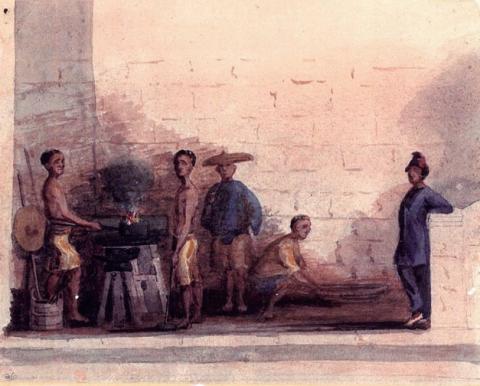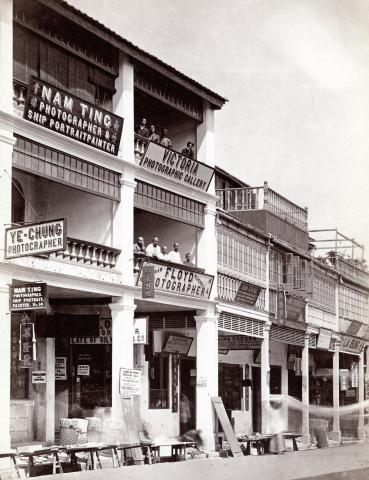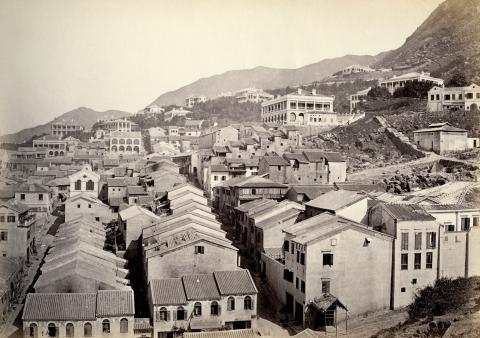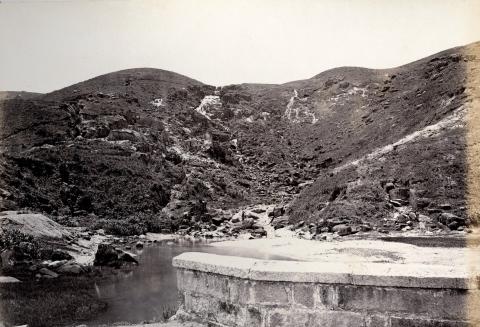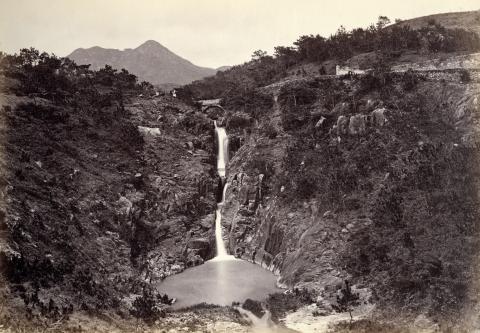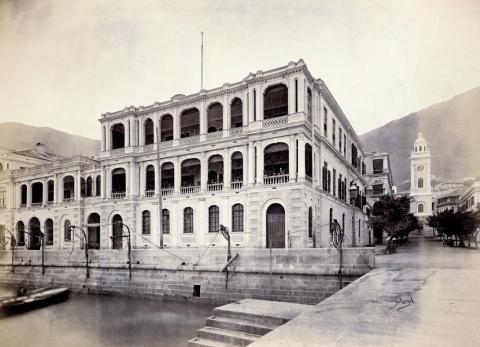Terry Bennett has written a three-volume history of photography in China in the nineteenth century. He has previously shared a chapter about early Chinese photographers in Hong Kong, and today he is back with two chapters about the Western photographers.
The first chapter documents the very first commercial photographers in Hong Kong, starting with Mr George West. Sadly, none of his photos are known to have survived, but his watercolours remain as evidence of his abilities:
Fig. 7. George R. West. ‘Chinese Blacksmiths. Macao,’ 1840s.
Watercolour. Caleb Cushing Papers, Manuscript Division,
Library of Congress.
West sailed to China in 1843 as part of Caleb Cushing’s diplomatic mission from America. He was given the title "Artist to the Expedition".
After China and America signed the Treaty of Wanghia, the diplomat's work was done. West could have sailed home with him, but instead stayed on. That decision led to him becoming the first commercial photographer in China, starting out in Canton in 1844, but moving to Hong Kong soon after:
Mr West begs leave to inform the inhabitants of Victoria that he has opened a Photographic or Daguerreotype Room in Peel Street, near Queen’s Road. His room will be open from 10 a.m. until 4 p.m. Single miniatures $3. $2 charged for each additional head in a group.
China Mail, 6th March 1845.
Sketching was his first love, so he went back in to China to continue his work. He tried his best to travel unnoticed:
... he was obliged to disguise himself and adopt the Chinese costume and habits. Having a clear olive complexion, dark eyes and hair, his transformation was complete. Securing the services of a faithful native servant, and generally affecting to be deaf and dumb, Mr West wandered for seven long years through various parts of the Chinese Empire, visiting places never before seen or known to Europeans.
But sometimes even his best precautions weren't enough:
... at one time he was sailing in the China Sea, when his vessel was attacked by pirates, and his Portuguese companions murdered. Mr West made a bold defence, and the freebooters agreed to save his life if he would yield without further resistance. The pirates then seized and stripped him of his clothing, lashed him to a sofa in the cabin of the junk, robbed him of all the money he had, cut down the boat’s sails, and threw them, with the anchors and chains, overboard, leaving the vessel to the mercy of the elements. By extraordinary exertions, with the men forming his crew, whose lives had been spared, [they] reached a place of safety. He then found himself entirely destitute of clothing, money, or any apparent means of extricating himself from his difficulties, yet he was not discouraged, nor, for one moment, turned aside from his determination to carry out his projects of illustrating Chinese life with his pencil ....
You can read more about George West's adventures and the other early Hong Kong photographers in Terry's chapter "The First Studios".
| If you're looking for a speaker for your club or business dinner, one of Gwulo's talks about old Hong Kong could be just what you need. Click for details. |
We re-join the story in the 1860s, with a much broader cast of photographers. They weren't as interesting as Mr West, but this time we get to see their photographs. Here are some from William P. Floyd, the most prolific of the group:
Fig. 1.7. William P. Floyd. ‘Victoria Photographic Gallery,’ c.1867.
Floyd’s studio at 62 Queen’s Road Central, Hong Kong.
Royal Asiatic Society, London.
Fig. 1.8. William P. Floyd. ‘Tai Ping Shan, Hong Kong –
Chinese quarter,’ c.1868. Author’s Collection.
Fig. 1.9. William P. Floyd. ‘Water Fall & The Bridge, East Point,’
c.1868. Numbered ‘71’ in the caption. Author’s Collection.
Fig. 1.10. William P. Floyd. ‘Waterfall Bay, Hong Kong,’ c.1868.
Author’s Collection.
Fig. 1.11. William P. Floyd. ‘Melchers & Co’s House,’ Hong Kong,
c.1868. Signed in the negative and numbered ‘11’ on the
photographer’s printed label. Author’s Collection.
To see more photos from Floyd and his contemporaries, continue reading Terry's chapter "Hong Kong Studios".
Many thanks to Terry and his publisher, Bernard Quaritch, for allowing us to see his work here on Gwulo.
|
Readers ask for information (photos, facts, memories, etc.) about:
New on Gwulo.com this week: |
